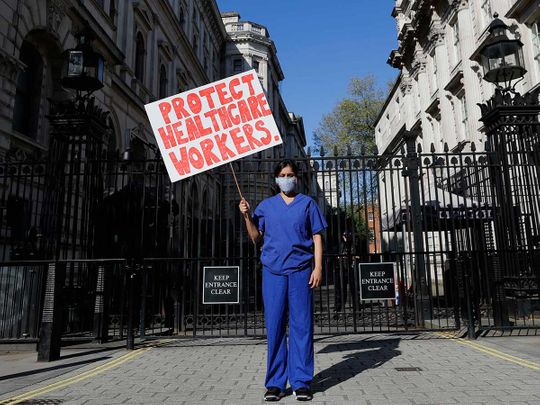
The IMF, which concluded on Sunday its annual Spring meetings with the World Bank, has warned that the corona “crisis is like no other” with the worst recession pending since the Great Depression. Yet, concerns are growing not just about the financial outlook, but also whether this might herald a new wave of political turbulence in the 2020s.
Worries about the growing prospect of political disorder has already been voiced by the UN — the IMF and World Bank’s fellow supranational organisation — with Secretary-General Antonio Guterres warning last week that the pandemic is threatening “an increase in social unrest and violence that would undermine our ability to fight the disease” in the biggest ever challenge for the organisation in its 75-year history. Specifically, Guterres highlighted pressing issues that could spark disorder as including: postponing of elections or referendums; the pandemic “triggering or exacerbating human rights challenges”; and erosion of trust in public institutions and wider uncertainty that could see further division and turmoil in some societies.
Of course, the potential for disorder is likely to be magnified the worst the economic crisis. Here the news is not good with the International Labour Organisation also warning that the pandemic will result in the loss of around 200 million jobs worldwide, and drastically cut the income of another 1.25 billion people.
With the global economy going into recession, instability could potentially be fuelled not just by intensified economic inequalities, but also the prospect of wider political and socio-economic discontent.
Take the example of South Asia where the World Bank said last week that the pandemic has already been a “perfect storm” with the region on course for its worst economic performance in 40 years, with decades of progress in the battle against poverty at risk, because of coronavirus.
India, Bangladesh, Pakistan, Afghanistan and other smaller nations, which have a 1.8 billion population collectively and some of the planet’s most densely populated cities, have so far reported relatively few coronavirus cases but there are growing fears they could be the next hotspots. The World Bank has slashed its growth forecast for the region this year to 1.8-2.8 per cent from its pre-pandemic projection of 6.3 per cent, with at least half the countries forecast to fall into a deep recession.
Yet South Asia is far from alone in this gloomy prognosis. For the first time in 25 years, sub-Saharan Africa is about to go into a protracted downturn, according to the World Bank, as demand drops from developed nations for raw materials such as oil and precious metals. Following 2.4 per cent growth last year, the estimate for sub-Saharan Africa in 2020 is between -2.1 and -5.1 per cent.
Turbulence and disruptive role of social media
In this context of economic vulnerability, what makes the security situation so fragile is the pre-existing febrile domestic politics of many countries since the 2008-09 international financial crisis, which spawned a long wave of international turbulence long before the coronavirus crisis. It is estimated that there have been about 100 large antigovernment protests since 2017, alone, with about 20 of these uprisings toppled leaders, including Prime Minister Saad Hariri in Lebanon last year, while several simmer along.
One driver of this sea of turbulence has been the disruptive role of social media. While there remains debate about how instrumental social media has been in fomenting political instability, whether one sees it as an essential component that translated discontent into concrete action, or accentuated what was already-inevitable, indisputably it has played an enabling, mobilising role that may only grow as technology advances and proliferates.
Fallout of economic inequality
Going forward, at least two other sets of issues will help determine the degree to which overall political instability will now increase, especially as much of the global economy goes into recession.
Firstly, economic inequality has grown in many countries, and may become increasingly politically salient with many of those who have taken to the streets in the last decade long feeling shut out of their nation’s prosperity. It is eminently plausible that, especially as coronavirus is impacting poor communities more than wealthier ones, that the pandemic could increase the political salience of inequality and spark further social unrest.
Secondly, it is often the young who are most impacted by deep recessions, as was the case in the years after the 2008-09 great recession when people aged between 15-24 (who constitute less than 20 per cent of the global population) accounted for approximately double the percentage of the unemployed. The more than younger people are impacted disproportionately from the coronavirus downturn in the global economy, putting many at risk of long-term damage to earnings potential and job prospects, the more that discontent will be fuelled.
Taken together, there is a significant prospect of a new wave of political unrest driven by the pandemic. With the global economy going into recession, instability could potentially be fuelled not just by intensified economic inequalities, but also the prospect of wider political and socioeconomic discontent which social media is giving added impetus to.
— Andrew Hammond is an Associate at LSE IDEAS at the London School of Economics









